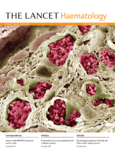
Lancet Haematology
Scope & Guideline
Catalyzing progress in the field of hematology.
Introduction
Aims and Scopes
- Translational Research in Hematology:
The journal emphasizes the importance of translational research that bridges the gap between laboratory findings and clinical applications, focusing on novel therapies and treatment strategies for hematological malignancies. - Clinical Trials and Evidence-Based Medicine:
Lancet Haematology publishes articles detailing results from clinical trials, systematic reviews, and meta-analyses that contribute to evidence-based practices in hematology, thereby aiding clinicians in making informed treatment decisions. - Innovative Therapies and Treatment Protocols:
The journal highlights advancements in the development and application of innovative therapies, such as CAR T-cell therapy, immunotherapy, and gene therapy, aimed at improving patient outcomes in various hematological conditions. - Patient-Centered Care and Quality of Life:
Research focusing on the quality of life and patient-reported outcomes in individuals with blood disorders is a key area of interest, reflecting the journal's commitment to patient-centered care. - Global Health Perspectives in Hematology:
Lancet Haematology addresses the global burden of hematological diseases, particularly in low- and middle-income countries, focusing on strategies to improve access to care and treatment equity.
Trending and Emerging
- Gene Therapy and Genetic Engineering:
There is a rising trend in publications related to gene therapy and genetic engineering, reflecting advancements in techniques and their potential applications in treating inherited blood disorders and malignancies. - Immunotherapy and CAR T-Cell Therapies:
Research on immunotherapy, particularly CAR T-cell therapies, is increasingly prevalent, indicating a significant shift towards leveraging the immune system in combating hematological malignancies. - Social Determinants of Health:
A growing emphasis on the social determinants of health and their impact on patient outcomes in hematology is emerging, highlighting the importance of addressing disparities in access to care and treatment. - Patient-Centric Research and Quality of Life:
An increasing number of studies focus on patient-reported outcomes and quality of life assessments, emphasizing the importance of patient perspectives in treatment decision-making and care strategies. - Environmental Impact of Hematological Care:
Emerging research addressing the environmental impact of hematology practices and strategies for sustainability is becoming more prominent, reflecting a broader awareness of healthcare's ecological footprint.
Declining or Waning
- Traditional Chemotherapy Approaches:
There is a noticeable decrease in publications centered on traditional chemotherapy approaches for hematological malignancies, as the field increasingly shifts towards targeted therapies and immunotherapies. - Single-Agent Therapy Studies:
The focus on single-agent therapies is waning as combination therapies and multi-modal treatment strategies gain traction, indicating a shift towards more comprehensive treatment regimens. - Basic Science Research in Hematology:
Research articles that solely focus on basic science without direct clinical application are becoming less common, as the journal prioritizes studies with immediate relevance to clinical practice. - Hematology in Pregnancy:
Although still important, there has been a decrease in the volume of research specifically addressing hematological conditions during pregnancy, as the field's focus broadens to encompass a wider range of patient populations.
Similar Journals

Indian Journal of Hematology and Blood Transfusion
Elevating Knowledge: Your Source for Hematology ExcellenceIndian Journal of Hematology and Blood Transfusion, published by SPRINGER INDIA, serves as a leading platform for disseminating original research, reviews, and case studies in the field of hematology. With an ISSN of 0971-4502 and E-ISSN 0974-0449, this journal has been instrumental in advancing knowledge from 2000 to 2024, providing insights into critical issues surrounding blood disorders and transfusion practices. Currently ranked in the Q3 category for Hematology for 2023, it reflects a commitment to high-quality scientific content amidst a competitive landscape where it ranks 97/137 in Scopus for Medicine - Hematology, placing it in the 29th percentile of its peers. The journal primarily addresses a diverse readership, including researchers, healthcare professionals, and students, aiming to foster innovation and collaboration within the field. Although it operates under a subscription model, access options for individual articles and institutional subscriptions ensure that valuable research is disseminated widely to enhance medical practice and education in hematology.
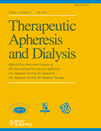
THERAPEUTIC APHERESIS AND DIALYSIS
Exploring cutting-edge methodologies in apheresis and dialysis.THERAPEUTIC APHERESIS AND DIALYSIS is an esteemed journal published by Wiley, focusing on the fields of hematology and nephrology. Since its inception in 2003, the journal has provided a dedicated platform for research and advancements in therapeutic apheresis and dialysis methodologies, offering valuable insights for clinicians and researchers alike. With an ISSN of 1744-9979 and an E-ISSN of 1744-9987, the journal has established itself within Q3 in both the hematology and nephrology categories. Its Scopus rankings place it at #44 in nephrology and #79 in hematology, indicating its growing influence in these critical areas of medical research. Although it does not currently offer open access, THERAPEUTIC APHERESIS AND DIALYSIS remains a vital resource for professionals aiming to stay at the forefront of innovations and practices through 2024 and beyond. Researchers, healthcare professionals, and students are encouraged to engage with the latest findings and discussions presented within its pages, solidifying its role in enhancing patient care and therapeutic strategies.
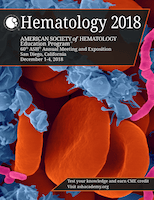
Hematology-American Society of Hematology Education Program
Cultivating Expertise in Blood HealthHematology-American Society of Hematology Education Program is a premier peer-reviewed journal dedicated to advancing the field of hematology through comprehensive educational content. Published by the American Society of Hematology, this journal plays a crucial role in disseminating knowledge to researchers, clinicians, and students in hematology and related disciplines. With an impressive Q1 status in the field, it ranks among the top journals at the forefront of hematological research, as evidenced by its 60th percentile ranking in Scopus' Medicine - Hematology category. Although it does not offer open access, the journal provides invaluable insights and educational resources from leading experts, focusing on the latest advancements, treatment protocols, and evolving understanding of blood disorders. Covering a wide range of topics, from basic research to clinical applications, this journal is essential for anyone seeking to deepen their expertise and stay informed on the latest developments in hematology. For further engagement, readers can access insightful articles published since 2001, ensuring a rich repository of knowledge for ongoing research and clinical excellence.
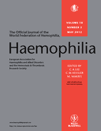
HAEMOPHILIA
Elevating standards in medical research and care.HAEMOPHILIA is a leading peer-reviewed journal published by Wiley, dedicated to advancing research and clinical practices in the fields of hematology and genetics. With an impressive Impact Factor and recognition within the Q1 category for Genetics (clinical), Hematology, and Medicine (miscellaneous), this journal presents a unique platform for the dissemination of high-quality research from 1995 to the present. Researchers in these dynamic fields will find invaluable insights through original articles, systematic reviews, and clinical trials, all aimed at improving therapeutic strategies and patient outcomes. Although it operates on a subscription basis, HAEMOPHILIA's commitment to excellence is reflected in its Scopus rankings, where it stands in the 74th percentile for hematology and the 71st percentile for clinical genetics. As an essential resource for academics, healthcare professionals, and students, HAEMOPHILIA plays a pivotal role in fostering innovation and collaboration within the global medical community.
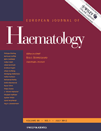
EUROPEAN JOURNAL OF HAEMATOLOGY
Pioneering Discoveries in Blood Disorders and TherapiesEUROPEAN JOURNAL OF HAEMATOLOGY, published by Wiley, serves as a vital resource for experts in the field of hematology, focusing on the latest advancements in blood disorders and therapies. With an ISSN of 0902-4441 and an E-ISSN of 1600-0609, this esteemed journal has been disseminating knowledge since 1986 and continues to thrive, converging its visionary approach through to 2024. Notably, it holds a distinguished Q2 ranking in Hematology and an impressive Q1 ranking in the broader category of Medicine (miscellaneous) as of 2023, highlighting its significant contribution to the scientific community. With a Scopus rank of #45/137 and a 67th percentile in the field, the journal is recognized for its rigorous peer-reviewed research, making it an indispensable publication for researchers, practitioners, and students aiming to stay at the forefront of hematological studies. Though not an open-access journal, it ensures broad accessibility to critical findings via its subscription model, thus fostering an informed and globally engaged audience.
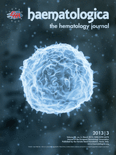
HAEMATOLOGICA
Transforming Hematology Through Knowledge and IntegrityHAEMATOLOGICA, published by FERRATA STORTI FOUNDATION, is a prestigious journal in the field of hematology, recognized for its high impact and contribution to advancing research in this critical area of medicine. With an impressive Q1 ranking in the 2023 category of Hematology and a notable Scopus rank of #12 out of 137, the journal serves as an essential platform for disseminating innovative studies, clinical trials, and comprehensive reviews from 1947 to 2024. Based in Italy, with a commitment to quality and academic integrity, HAEMATOLOGICA fosters collaboration among researchers, practitioners, and students interested in the latest developments and methodologies within hematological science. Although it does not offer open access, the journal ensures that valuable insights are accessible through institutional subscriptions, emphasizing its role in shaping the future of hematologic research.

HemaSphere
Unveiling the latest in hematologic breakthroughs.HemaSphere, published by WILEY, stands at the forefront of hematology research, offering a vital platform for the dissemination of cutting-edge findings in the field. Since its inception in 2017 and official transition to Open Access in 2018, the journal has positioned itself as a leading conduit for high-impact research, maintaining a prestigious Q1 quartile ranking in the Hematology category as of 2023. Addressed in the United States at 111 River St, Hoboken, NJ, HemaSphere aims to foster a global dialogue among researchers, clinicians, and students by providing unrestricted access to high-quality content that encompasses clinical and experimental advancements. With an array of engaging articles, reviews, and commentaries, HemaSphere contributes significantly to the advancement of hematology, ensuring that critical knowledge is readily accessible to enhance patient care and innovative research. To explore the latest developments and breakthroughs in this dynamic field, we invite scholars, professionals, and students to engage with HemaSphere and elevate their understanding of hematologic science.
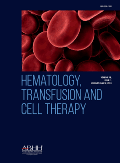
Hematology Transfusion and Cell Therapy
Empowering discoveries in transfusion medicine.Hematology Transfusion and Cell Therapy, published by Elsevier, is a leading Open Access journal dedicated to advancing the fields of hematology, immunology, and transfusion medicine. Since its establishment in 2018, this journal has provided a vital platform for sharing innovative research and clinical advancements in the management of blood disorders and cellular therapies. Based in Brazil, it attracts a global audience, facilitating access to high-quality research that influences clinical practice and policy. With a current impact factor that places it in the Q3 category for both hematology and immunology as of 2023, the journal is recognized for its rigorous peer-review process and commitment to disseminating significant findings. By featuring a diverse range of articles, from original research to reviews, Hematology Transfusion and Cell Therapy aims to foster collaboration and knowledge sharing among researchers, professionals, and students alike, empowering them to tackle emerging challenges in their fields.

Iraqi Journal of Hematology
Shaping the Future of Hematological PracticesIraqi Journal of Hematology is a prominent peer-reviewed open-access journal dedicated to advancing the field of hematology. Published by Wolters Kluwer Medknow Publications, this journal provides a platform for researchers, professionals, and students to share cutting-edge findings and developments in various aspects of hematology, including blood diseases, diagnostics, and innovative treatments. Since its transition to open access in 2016, the journal has significantly increased its reach, allowing for wider dissemination of critical research to a global audience. With an ISSN of 2072-8069 and an E-ISSN of 2543-2702, the Iraqi Journal of Hematology strives to adhere to the highest scholarly standards and plays a vital role in the ongoing discourse in hematological research. Researchers are encouraged to contribute to this essential resource for the scientific community, contributing to the advancement of knowledge that ultimately improves patient care and treatment outcomes.
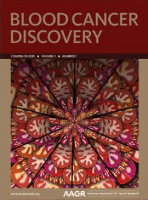
Blood Cancer Discovery
Uncovering Breakthroughs in Blood Cancer ScienceBlood Cancer Discovery is a premier academic journal published by the American Association for Cancer Research, dedicated to advancing the understanding of hematologic malignancies through cutting-edge research in the fields of oncology, biochemistry, and molecular biology. With an impressive impact factor and recognition as a Q1 journal across multiple disciplines, including cancer research and hematology, Blood Cancer Discovery serves as an essential platform for scholars and practitioners alike, facilitating impactful discourse and dissemination of pioneering findings. This open-access journal, established within the vibrant academic landscape of the United States, aims to bridge gaps in research and foster collaborations to ultimately enhance patient outcomes. Its Scopus rankings demonstrate its vital role in the critical advancement of cancer research and therapeutic development. By inviting contributions from a diverse range of disciplines, Blood Cancer Discovery is poised to drive innovation and inspire future advancements in understanding blood cancers.